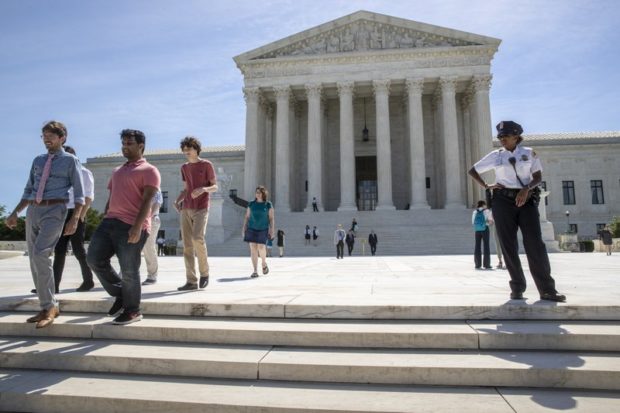U.S. Supreme Court upholds Trump travel ban; nixes discrimination claim

Visitors depart the Supreme Court early Monday, June 25, 2018. The justices are expected to hand down decisions this week as the court’s term comes to a close. AP PHOTO
WASHINGTON — The Supreme Court on Tuesday upheld President Donald Trump’s ban on travel from several mostly Muslim countries, rejecting a challenge that it discriminated against Muslims or exceeded his authority.
The 5-4 decision Tuesday is the court’s first substantive ruling on a Trump policy, and the president quickly tweeted his reaction: “Wow!”
Chief Justice John Roberts wrote the majority opinion, joined by his four conservative colleagues.
Roberts wrote that presidents have substantial power to regulate immigration. He also rejected the challengers’ claim of anti-Muslim bias.
But he was careful not to endorse either Trump’s provocative statements about immigration in general or Muslims in particular.
“We express no view on the soundness of the policy,” Roberts wrote.
The travel ban has been fully in place since December, when the justices put the brakes on lower court rulings that had ruled the policy out of bounds and blocked part of it from being enforced.
In a dissent she summarized in court, Justice Sonia Sotomayor said, “History will not look kindly on the court’s misguided decision today, nor should it.”
‘Anti-Muslim animus’
Sotomayor wrote that based on the evidence in the case “a reasonable observer would conclude that the Proclamation was motivated by anti-Muslim animus.” She said her colleagues in the majority arrived at the opposite result by “ignoring the facts, misconstruing our legal precedent and turning a blind eye to the pain and suffering the Proclamation inflicts upon countless families and individuals, many of whom are United States citizens.”
Justices Stephen Breyer, Ruth Bader Ginsburg and Elena Kagan also dissented.
The policy applies to travelers from five countries with overwhelmingly Muslim populations — Iran, Libya, Somalia, Syria and Yemen. It also affects two non-Muslim countries, blocking travelers from North Korea and some Venezuelan government officials and their families. A sixth majority Muslim country, Chad, was removed from the list in April after improving “its identity-management and information sharing practices,” Trump said in a proclamation.
The administration had pointed to the Chad decision to show that the restrictions are premised only on national security concerns.
The challengers, though, argued that the court could not just ignore all that has happened, beginning with Trump’s campaign tweets to prevent the entry of Muslims into the United States.
The travel ban has long been central to Trump’s presidency.
He proposed a broad, all-encompassing Muslim ban during the presidential campaign in 2015, drawing swift rebukes from Republicans as well as Democrats. And within a week of taking office, the first travel ban was announced with little notice, sparking chaos at airports and protests across the nation.
Trump vision
While the ban has changed shape since then, it has remained a key part of Trump’s “America First” vision, with the president believing that the restriction, taken in tandem with his promised wall at the southern border, would make the Unites States safer from potentially hostile foreigners.
Critics said the changes didn’t erase the ban’s legal problems, and lower courts largely agreed.
The current version dates from last September and it followed what the administration has called a thorough review by several federal agencies, although no such review has been shared with courts or the public.
Federal trial judges in Hawaii and Maryland had blocked the travel ban from taking effect, finding that the new version looked too much like its predecessors. Those rulings that were largely upheld by federal appeals courts in Richmond, Virginia, and San Francisco.
But the Supreme Court came to a different conclusion Tuesday. The policy has “a legitimate grounding in national security concerns,” and it has several moderating features, including a waiver program that would allow some people from the affected countries to enter the U.S., Roberts said. The administration has said that 809 people have received waivers since the ban took full effect in December.
Roberts wrote that presidents have frequently used their power to talk to the nation “to espouse the principles of religious freedom and tolerance on which this Nation was founded.” But he added that presidents and the country have not always lived up “to those inspiring words.”
The challengers to the ban asserted that Trump’s statements crossed a constitutional line, Roberts said.
“But the issue before us is not whether to denounce the statements. It is instead the significance of those statements in reviewing a Presidential directive, neutral on its face, addressing a matter within the core of executive responsibility,” he said

